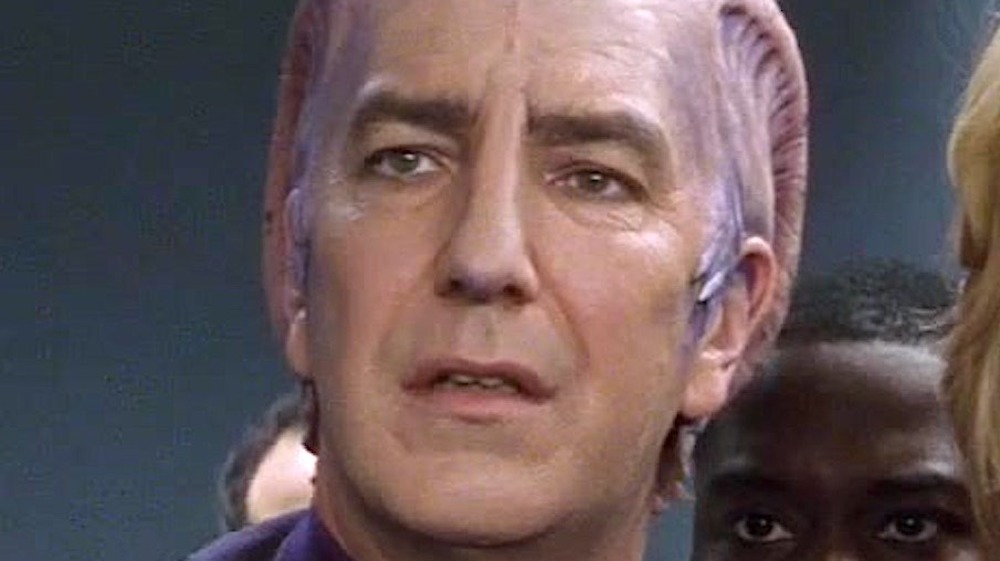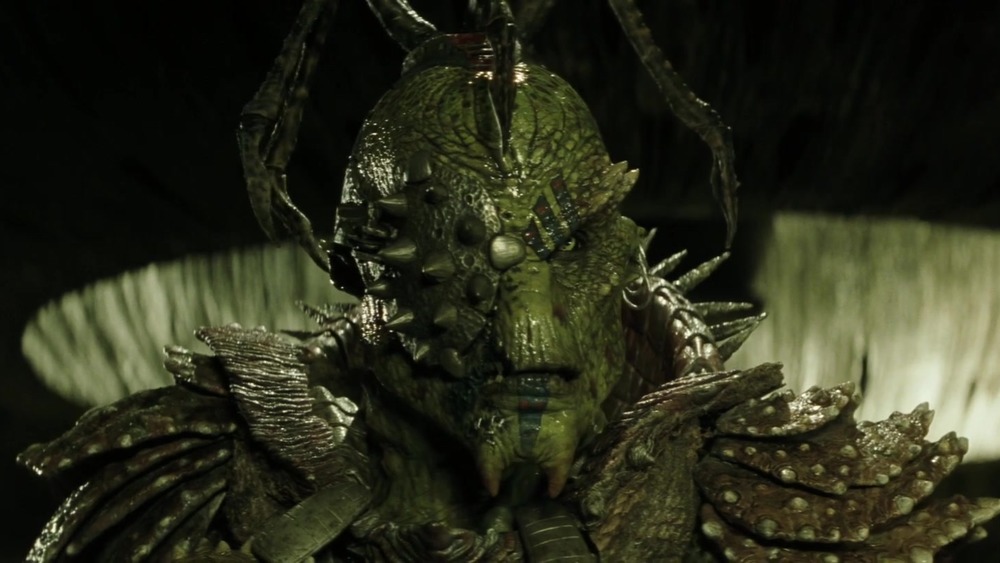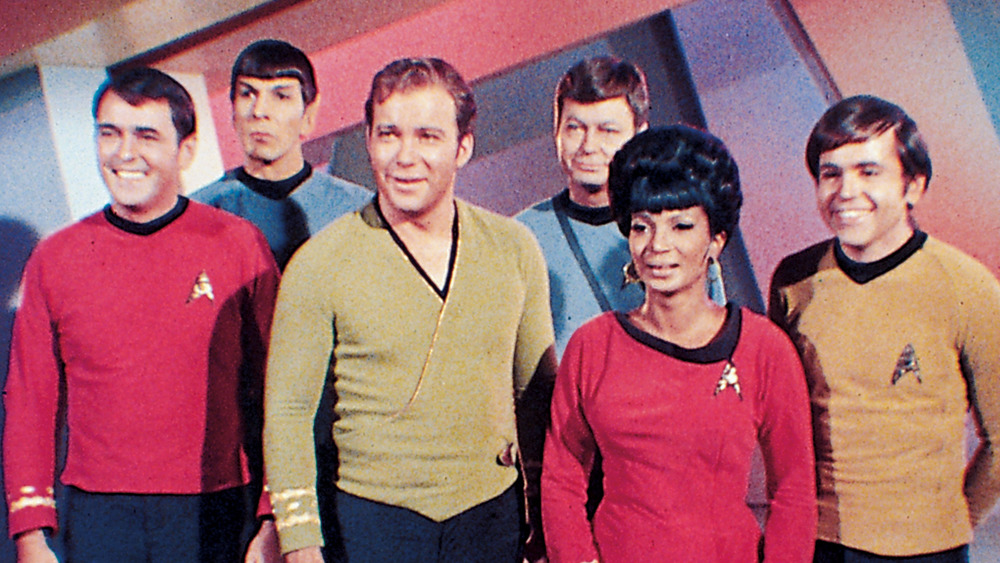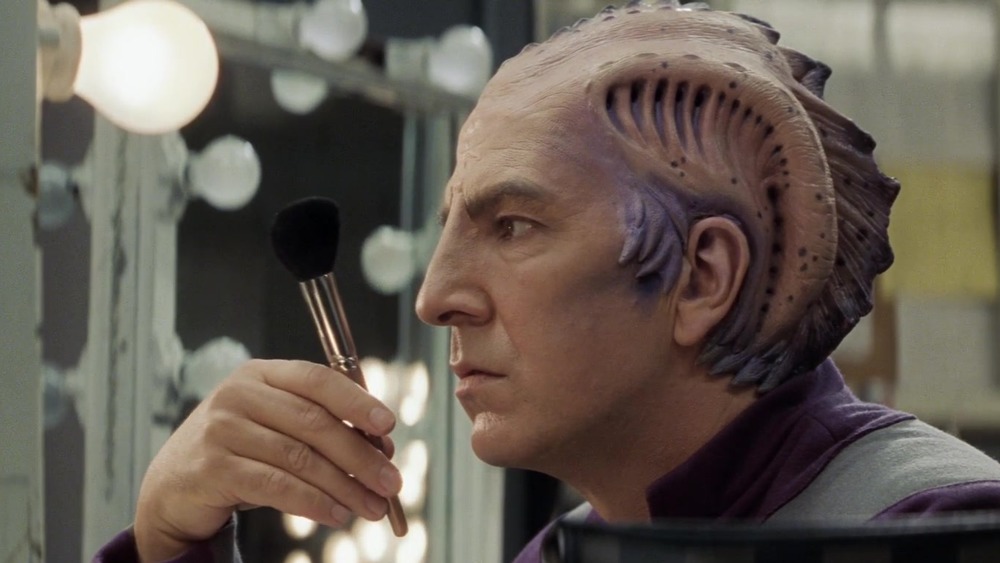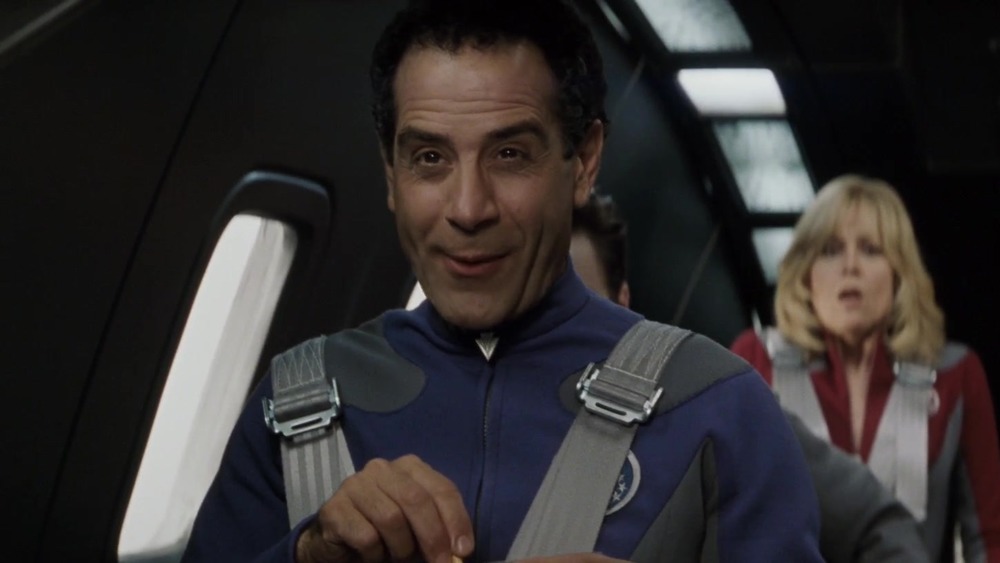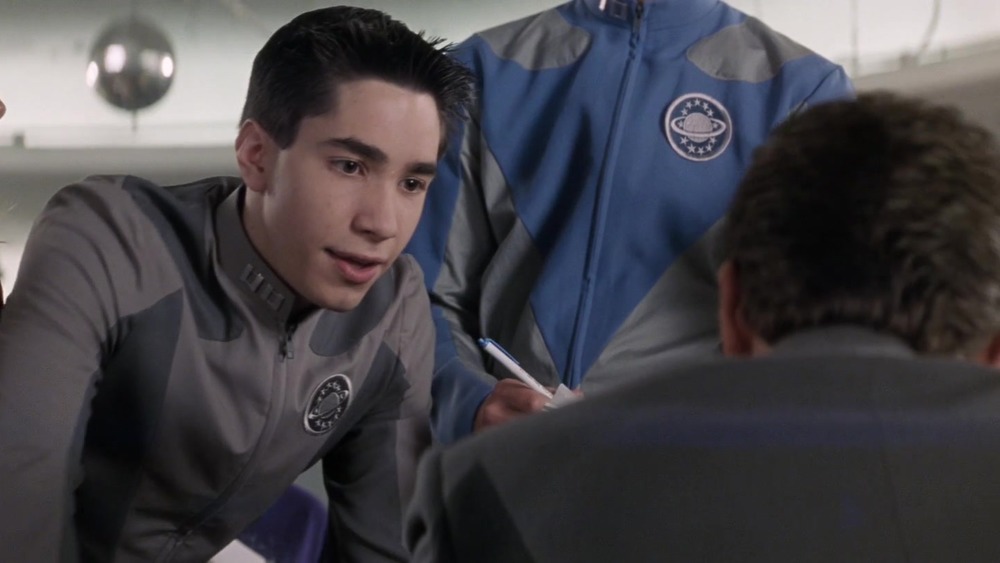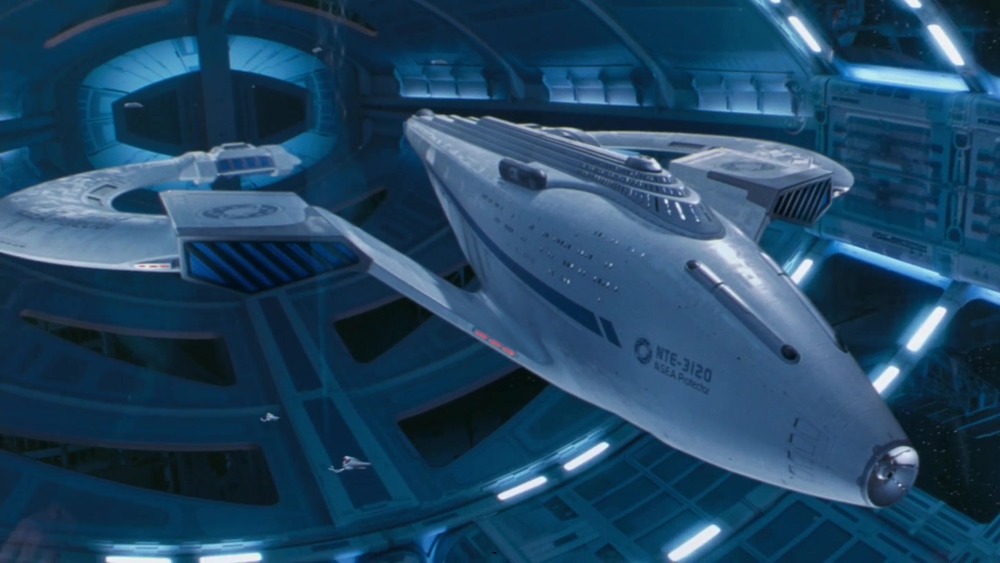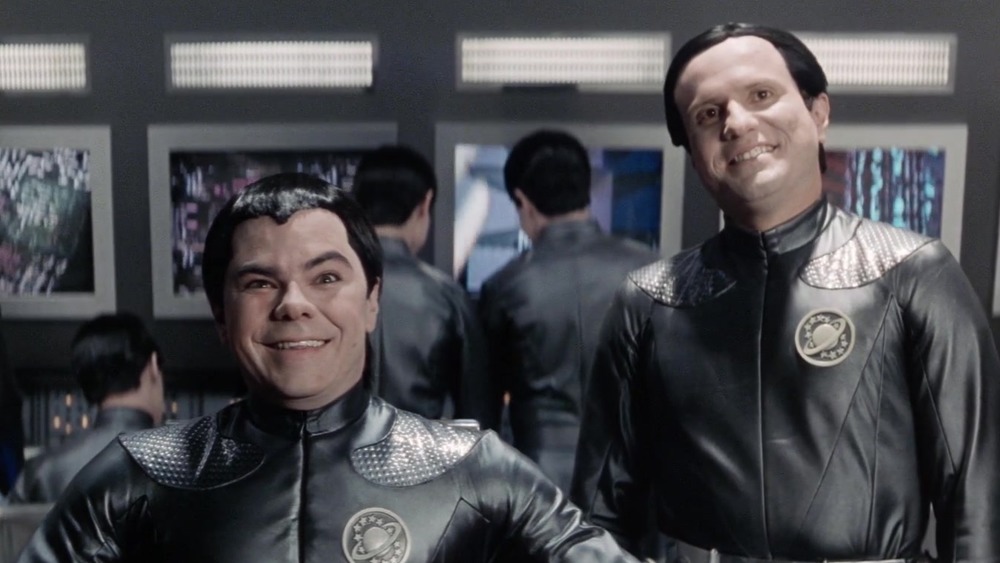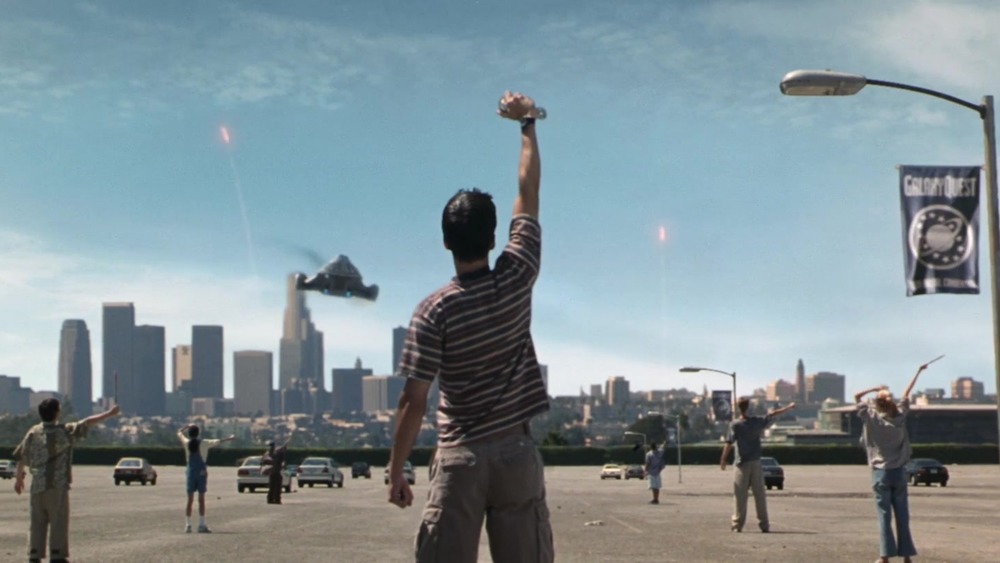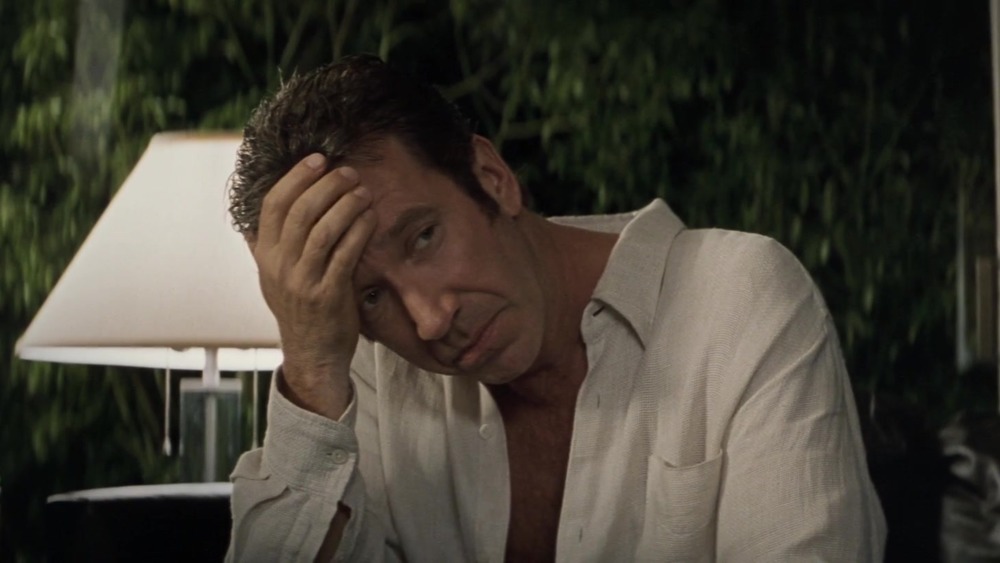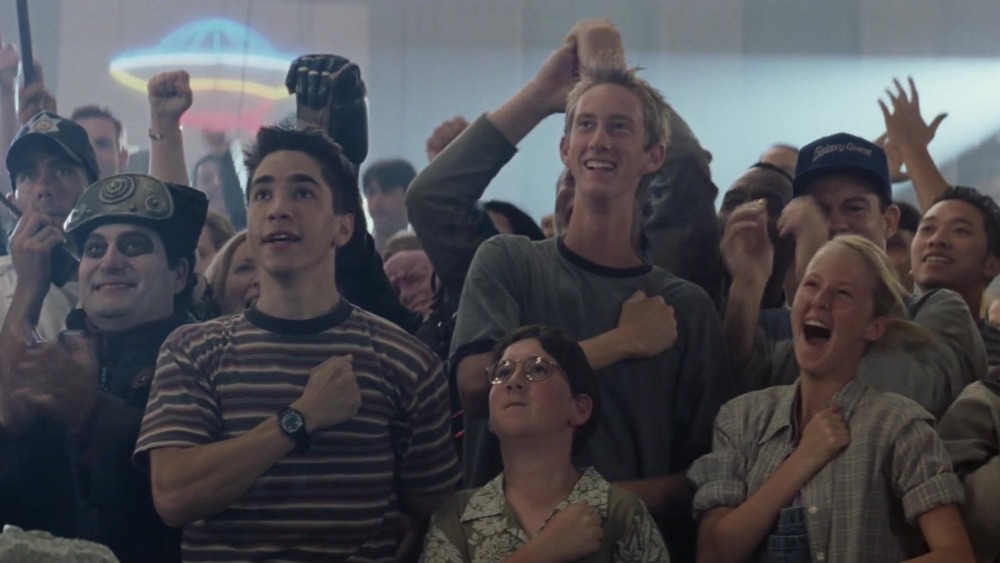Things Only Adults Notice In Galaxy Quest
In 1999, director Dean Parisot released Galaxy Quest, a sci-fi comedy based on a novel premise: What if a scientifically advanced alien culture saw a Star Trek-like TV show, thought it was real, and recruited its actors to help them complete a dangerous mission? In the film, the out-of-work stars of the fictional cult series Galaxy Quest find themselves on a working replica of their show's starship and surrounded by sweet, wide-eyed aliens who believe that they are the greatest heroes ever to explore outer space. Led by Jason Nesmith (Tim Allen), who hopes to recapture the glory of playing the maverick Commander Taggart, the tight-knit group of actors muddle through a real life-and-death space adventure while coping with the baggage they've accumulated during their years together.
A modest hit at the box office, the real Galaxy Quest became a cult classic in its own right, often hailed by Trekkies as one of the best, if not the best Star Trek-inspired feature film. It's a terrific and clever comedy that's both a satire and a loving tribute to space sci-fi and its fanbase that features fantastic performances from Sigourney Weaver and Alan Rickman, but the executives at DreamWorks marketed it as a kids' movie. There's plenty for kids to enjoy about Galaxy Quest, but it's a movie for all ages that has a lot to offer adults both on a textual and meta-textual level. Plus, like any comedy, there are a few "Hey, wait a minute!" moments for grown viewers.
The sci-fi elements are all played straight
While Galaxy Quest is a joke-dense, light-hearted comedy, its sci-fi world is treated as seriously as it would be in a legitimate Star Trek movie. The design and production values are on par with other big-screen space adventures of its day, and similar talent and methods were employed to make it that way. The visual effects and starship models were created by Industrial Light & Magic, the top shelf effects house that was born from the production of Star Wars. The makeup effects for the villainous Sarris and his soldiers were headed up by Stan Winston, the legendary artist behind The Thing.
According to Never Surrender: A Galaxy Quest Documentary, making the sci-fi elements the "straight man" of the comedy was a deliberate decision. In order for the film to work, the sci-fi stakes needed to be totally real, with the comedic elements stemming from the human characters or from the way the Thermians adopted nonsensical choices from the Galaxy Quest TV show into their ship. There needed to be a clear delineation between the real dangers of space and the very fake TV world to which the actors are accustomed. Sarris, the rock monster, the starships and technology all have to seem as impressive or as threatening as they would appear to our fish-out-of-water protagonists. It's the context that makes them funny, not the content itself.
The Galaxy Quest casts mirrors real relationships from the set of Star Trek
Galaxy Quest centers around the strained dynamic between star Jason Nesmith and the rest of the cast of the Galaxy Quest TV series, which is similar to the decades-long conflict between Star Trek's William Shatner and his costars. Much of the cast of Star Trek have openly criticized or expressed dislike for Shatner, while Shatner expresses puzzlement as to why. Castmates Leonard Nimoy and George Takei have complained that Shatner would use his power as #1 on the show's call sheet to steal other actors' lines or close-ups or to try and hog press attention. Like Nesmith, Shatner doesn't seem to find anything wrong with his own behavior despite multiple, similar criticisms, but while Jason seems to harbor no ill will towards the crew, Shatner is famously defensive and publicly casts Takei as irrational.
The rest of the Trek cast aside from Shatner, however, has enjoyed a very close, family-like relationship much like the one seen in Galaxy Quest. In the film, Gwen DeMarco says that the cast "[works] together, or not at all," mirroring Leonard Nimoy's refusal to participate in Star Trek: The Animated Series unless Nichelle Nichols and George Takei were also hired. Nichols and Walter Koenig were Best Lady and Best Man at Takei's wedding, to which Shatner was not invited. Shatner also did not attend Leonard Nimoy's funeral due to a scheduling conflict, but says he doesn't think he'd have been welcome anyway.
Alexander Dane's career crisis reflects Leonard Nimoy's
In Galaxy Quest, Alexander Dane (Alan Rickman) is a serious actor who feels that his career has been destroyed by his years playing Dr. Lazarus, a silly role on a campy television series. Dane's plight is far from uncommon, as actors who do sci-fi television (particularly those who do so under heavy prosthetics) often find themselves shoehorned into similar roles. But, much as the conflict between the Galaxy Quest reflects the friction between the cast of Star Trek, Alexander's frustrations seem to be inspired by the life of one particular Trek cast member, Leonard Nimoy.
While Nimoy might not have expressed the comical levels of resentment that Dane does in the film, he did struggle with being so closely identified with Spock and found that it made it hard to further his career as an actor, leading to his moving behind the camera as a director. This struggle became exaggerated in the public eye when his first autobiography was published under the controversial title I Am Not Spock, which created a misconception (particularly among those who did not read the book) that Nimoy flatly disliked the role and the place it created for him in pop culture. Nimoy sought to correct this perception by naming his 1995 follow-up I Am Spock.
While Dane's story is more dramatic — Nimoy was never abducted by aliens, as far as we know — he also makes peace with the role by the end of the film.
Fred Kwan is high for the entire movie
One of Galaxy Quest's running gags is the nearly constant quiet calm of Fred Kwan (Tony Shalhoub), who doesn't seem to respond appropriately to any of the peril and weirdness that happens throughout the film. It's easy to read the chill, frequently snacking Fred as being in a marijuana-fueled haze throughout the action. This is actually deliberate, and is a holdover from the original intent that Galaxy Quest be a more adult-oriented comedy.
Tony Shalhoub was originally up for the part of Guy, which ultimately went to Sam Rockwell, but director Dean Parisot invited Shalhoub to play Fred Kwan instead. Shaloub initially declined, as he felt an Asian actor should play an Asian character, but the two determined that Fred himself is actually a non-Asian actor playing an Asian character. This development reminded Shalhoub of an (unconfirmed) rumor that actor David Carradine, while portraying the whitewashed role of Kwai Chang Cain on the 1970s TV series Kung Fu, smoked weed constantly on set. Shalhoub and Parisot invented a backstory for Fred that he had done the same thing and then ended up becoming a burnout, and the part was totally rewritten with that in mind.
Very little of this made it into the final film, with many of Shalhoub's stoner gags being cut and the only acknowledgement of Fred's faking his ethnicity being a passing reference to Kwan not really being his last name.
Brandon and his buddies must be loaded
Early in Galaxy Quest, we learn that Jason Nesmith has been hired to make a personal appearance by young fan Brandon (Justin Long) and his friends. Their exact age is unclear, but they appear to be teenagers. We never see what Brandon and company have in mind for the appearance, but they keep referring to it as "the voyage" and it appears to be some sort of role-playing scenario. Jason says the kids had "built a little set in their basement." Diverted from this job by the Thermians, Jason never shows up to meet them.
Consider for a moment how expensive it must be to book Jason Nesmith for a one-hour appearance. Yes, he's an out of work actor, but he's an out of work actor with a nice house in the Hollywood hills who is apparently in enough demand to warrant a three-day convention dedicated only to his long-canceled TV series. Serious acting work may have dried up, but there's no shortage of people looking to pay money for Jason Nesmith's attention.
In 2021, a ten-minute live Zoom call with Star Trek actor Jonathan Frakes costs $750. Getting this film's equivalent of William Shatner to play-act his famous role for an hour in their basement could not be cheap, even if you skimp on the limo.
The Thermian cultural revolution must've happened very quickly
After receiving and misinterpreting Earth's television broadcasts, the naive and friendly alien species called the Thermians remodel their entire society and technology after Galaxy Quest in excruciating detail. Earth's TV signals really do escape our planet and travel into space at the speed of light, so this conceit isn't 100% implausible and certainly works within the suspension of disbelief of a light sci-fi comedy. But when you do the math, it leads to the conclusion that the Thermians' Galaxy Quest obsession must've been extremely rapid.
Let's be generous and imagine that Thermia is a very close neighbor to Earth. The closest star to our sun, Proxima Centauri, actually does have a planet, Proxima b. Proxima is about 4.2 light years from Earth, so it would take a television broadcast 4.2 years to reach there. Galaxy Quest aired roughly between 1977 and 1982, and would reach Proxima beginning in the early 1980s.
The film is set in 1999 or 2000, so if the Thermians lived on Proxima b they would still have less than two decades to reconstruct their culture and develop or repurpose their technology to mimic the Galaxy Quest "historical documents" before the story begins. In actuality, they'd probably be much farther away, and every light year's distance means one fewer year to work with.
It's obvious when watching the film that the Thermians are scientifically brilliant, but factoring for real-life physical constraints, their genius is actually understated.
The Thermians don't really get a happy ending
Throughout Galaxy Quest, the audience is treated to the light-hearted antics of the Thermians, the friendly alien species who has found inspiration from the sci-fi television series that they've mistaken for a documentary. When we last see the Thermians in the film, Mathezar (Enrico Colantoni) is commanding the NSEA Protector with a newfound confidence, and the ship warps off into open space after dropping off the television cast back on Earth. A playful musical score accompanies this brief, single take scene of the Thermians setting off on their next adventure.
But as light and positive as this scene is framed and as cheerful as the Thermians seem, their future is actually looking pretty bleak. As Teb (Jed Rees) reveals to Jason and company earlier in the film, the crew of the Protector is all that remains of the Thermian civilization, the rest having been exterminated by General Sarris (Robin Sachs). Aside from the Protector's starport, which is built into the crust of a shattered planetoid, Mathezar and his crew have no home to which to return. Being forced to simply wander the stars in their advanced starship isn't the worst fate that could befall the Thermians — it is, after all, part of the fantasy of the Galaxy Quest series — but it will be a struggle, and the crew will have to cope with the apparently recent demise of their homeworld at some point or another.
There would have be a massive cover-up
The film's finale sees the human cast of Galaxy Quest (and the Thermian Laliari) crash-landing the command deck of the real NSEA Protector into the convention hall and making a dramatic entrance to the last day of Galaxy Quest Convention 18. The fans inside the hall seem to accept that this is just an elaborate stunt, but the moment they leave the building, they're going to notice that there's a path of destruction running through the parking lot and a gaping hole in the side of the building. Some of their cars have been destroyed. People are going to put two and two together.
The very last minute of the film reveals that, following this adventure, Galaxy Quest returns to television for new episodes with an expanded cast. But while it would have no place in the story of the film, there would have to have been some earlier consequences of an alien spaceship crash-landing into a California civic center. Did the U.S. government get involved? Was there a cover-up? How did they keep people from talking?
One comical scenario to imagine: What if, in exchange for the silence of the hundreds of Questerians who witnessed a UFO landing and the Hollywood actors who just had a wild alien encounter, a shady government entity offered them the one thing they wanted most — the return of the cheesy TV show they love? (Plus replacing a couple of smashed minivans.)
None of the characters have any other family
Part of what keeps the stakes of Galaxy Quest feeling light is that there are no negative consequences of the actors being essentially abducted by aliens near the start of the film. When the Gwen and the crew tell Jason that they want to go home shortly after realizing that they've been transported off-world, Jason argues that all they have waiting for them at home is "paying their bills and feeding their fish," a claim that receives no counterargument.
This is a sad realization about the characters, but it's very convenient for the story. None of the cast has partners waiting for them to come home or kids who need to be picked up from soccer practice. No one tries to get in touch with anyone back on Earth, at least not until Jason needs to reach Brandon for some tech support. The Galaxy Quest cast is a family, evidently the only close family they have, which ratchets up the importance of their relationship and makes their ability to get along the most important personal stakes for these characters.
That, and the danger of getting killed or tortured by a sadistic alien general.
Galaxy Quest is about the value of fantasy
Galaxy Quest is a breezy comedy adventure, but it's also a story about how investing emotionally in something fictional, or even ridiculous, can enrich your life. The Thermians found peace and purpose in genuinely and literally believing in idealized heroes. The Questerians, too, clearly find a lot of enrichment in knowingly participating in the fantasy of Galaxy Quest through fandom. Both groups are the butt of jokes in the film, but those jokes are mostly good natured.
While the Thermians and the Questerians have already learned this before the start of the story, over the course of the film we see the jaded and exhausted actors find within themselves the heroes that their fans — human and alien — believe them to be. Jason always has a big head, but he only truly becomes The Commander once he puts his trust in his friends and comes clean to Mathezar about how he's deceived them. Alexander finds Dr. Lazarus within himself by understanding what he means to Quelleck, who sees him as a surrogate father. Fred, Tommy (Daryl Mitchell), and Guy (Sam Rockwell) each find a new confidence by rising to the standards of their characters, or in Guy's case, beyond them. Apart from Gwen, who is already a far more complete person than Tawny Madison, the cast grows by drawing strength from people who look at them and see the people that they'd like to be, even if they weren't real to begin with.
